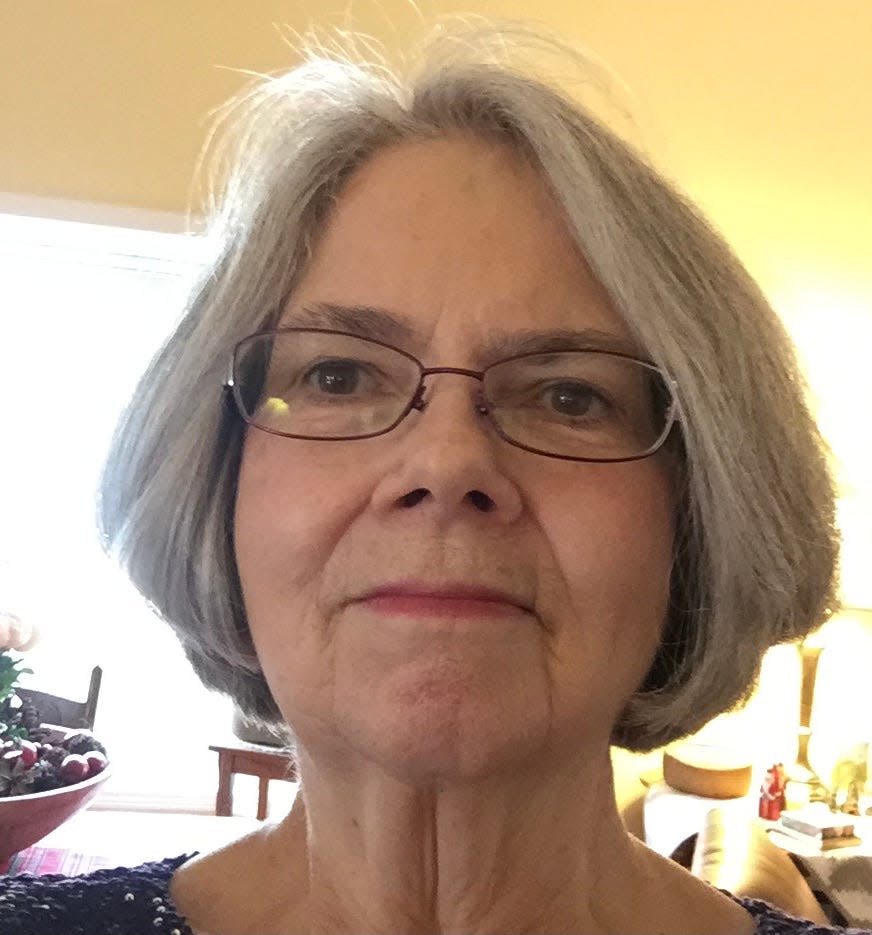Barbara Mezeske: The power of words
Words have enormous power that comes from the emotions we attach to vocabulary. I had a dog with a very large human vocabulary. The word “squirrel” sent her to the window on full alert. My 4-year-old granddaughter hears “popsicle” and heads for the freezer. The dog and the child are conditioned to react to these words with enthusiasm.
Adults respond emotionally to words, too.
You can buy T-shirts that proclaim “God, Guns, and Country.” All three words evoke emotional responses: “Yes! I love God.” “Yes! I support the Second Amendment,” and “Yes! I love America.”

English majors want to know where the adjectives are.
Why? Because emotional responses to nouns that we have been conditioned to affirm do not help us live our lives, be in community with others or make political choices. Nouns alone have no nuance. Slogans are not the same as policies.
What does it mean to proclaim “God” on your shirt? Is it the god of the Old Testament and the 10 Commandments? Is it the Holy Trinity? Is it the servant god Jesus? Is it the god who welcomes strangers, or who smites them? Is it the Buddha? Or Allah? In our pluralistic society, you can’t take that meaning for granted. Is the person wearing that shirt likely to give money to a beggar, or to call the cops on him? On Sunday morning, will you find that person in a pew, or on the golf course?
What about guns? What kinds of guns are we talking about? Should everyone have one, or only some people? Does the community have any stake or say in who can be armed and where they can carry their weapons? Are guns for hunting or target practice? Are they for intimidation? Are they tools to protect or to commit a crime?
According to Everytownresearch.org, America has 26 times more gun homicides than other high-income countries. In the face of that reality, responsible gun owners are calling for regulation of firearms, suggesting that gun policies are neither as partisan nor as black and white as T-shirts suggest. Gun owners, like everyone else, want to feel reasonably safe while shopping, attending concerts or being in public spaces. Opposing all gun restrictions is becoming a fringe position, propping up the political careers of those who see the issue as their avenue to election.
How about “country?” What about America creates the emotional reaction? Is the flag a sacred object, or a symbol of sacred ideals? Did you serve in the military? Are you an immigrant or the child of immigrants? Are you a woman or a man? Do you feel safe here? Does our economic system seem fair? “Country” is an especially complex set of assumptions and beliefs that depend a great deal on your position in society, your ability to own or rent a home, and your success in finding work that pays the bills. It depends on your race, your gender, and your family history.
Beyond all this, the T-shirt doesn’t give us a clue as to how the person wearing it understands the relationship between these nouns.
Last summer, a billboard near my home said “Freedom and Family.” That was the slogan chosen by Ottawa Impact candidates running for the county board of commissioners. Emotionally, we are conditioned to react positively to those words.
Seven months into the term of those people, it appears the words alone don’t convey the breadth of meaning “freedom” and “family” have for our representatives. In their opposition to programming and to health initiatives that reach out to LGBTQ+ families or to families with people struggling with mental health or disabilities, our commissioners signal the narrowness of their definition of “family.” And “freedom” to them certainly means owning and carrying guns, even in violation of state and federal gun laws. That’s the intent of declaring Ottawa a "constitutional county."
The commissioners also use the term “government schools” in asserting that American public education is saturated with “woke” ideology and sexualization of children. Scary words. But a “government school” is really a public school, something Americans have enjoyed since the 19th century when the nation as a whole committed itself to an educated citizenry. These are “government” schools only in the sense that they are supported by taxes, as they should be if education is not reserved for those wealthy enough to provide private education for their children.
We see countless examples in this heated political climate of words used as tools of manipulation, often disguising meaning. “Moms” and “liberty” evoke positive feelings, and yet Moms for Liberty has been declared an extremist group by the Southern Poverty Law Center, which tracks hate and antigovernment groups. Moms for Liberty seeks to undermine public education and divide communities.
What’s the lesson here? Simply this: Words with powerful connotations are weapons in the hands of politicians who want our money and votes, but don’t care to lay out their hidden agendas. As citizens, we need to take a hard look at what lies behind the campaign posters, pins, and slogans. Never cast a vote for nouns that are shouted at you.
— Community Columnist Barbara Mezeske is a retired teacher and resident of Park Township. She can be reached at bamezeske@gmail.com.
This article originally appeared on The Holland Sentinel: Barbara Mezeske: The power of words

